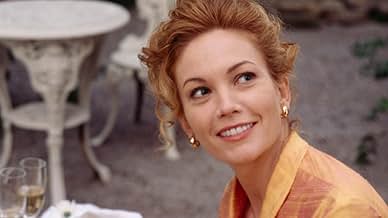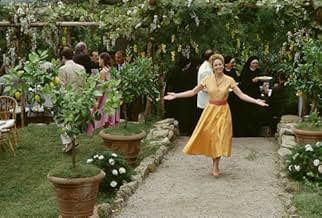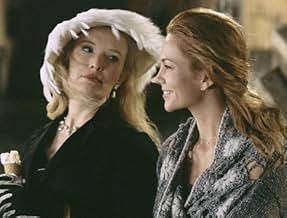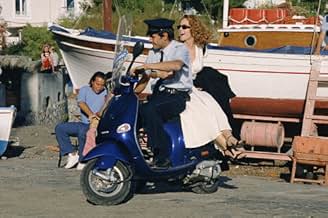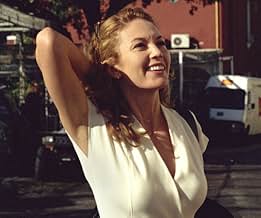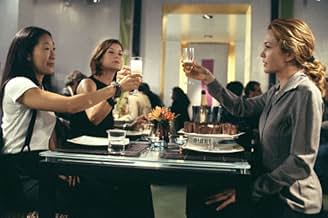Eine Schriftstellerin kauft impulsiv eine Villa in der Toskana, um ihr Leben zu verändern.Eine Schriftstellerin kauft impulsiv eine Villa in der Toskana, um ihr Leben zu verändern.Eine Schriftstellerin kauft impulsiv eine Villa in der Toskana, um ihr Leben zu verändern.
- Auszeichnungen
- 5 Nominierungen insgesamt
Giulia Louise Steigerwalt
- Chiara
- (as Giulia Steigerwalt)
Empfohlene Bewertungen
Romance . It is the first conclusion and it is far to be wrong. But... . It is more. Because it is a sweet exploration of the second chance. Because...Tuscany, the real lead character. Because...lovely performances and the taste of coffee with few cinnamon flavor. And because, in many scenes, it could be your dream in facts. And, sure, because Diane Lane. So, just lovely.
It's a story about how people who want things badly rush themselves into experiences that are worse than their previous ones. It's a good movie with several deep messages. The movie also has a certain atmosphere that makes you feel as if you are in Tuscan on a trip yourself. I have to disagree with the view that says you need to be in love to enjoy the movie. All what you need is some depth and you will definitely relate to the protagonist. She happens to be healing from a failing marriage but you can relate to her story if you are dealing with any kind of problems in your life.
There is one specific part of the movie which I truly like is the one where she defends the love story of a young couple though she was hurt. This shows that even though she failed she didn't cease to believe in love. She succeeded in going out of the egocentricity of a person who usually hates good for people if his life is not working successfully.
There is one specific part of the movie which I truly like is the one where she defends the love story of a young couple though she was hurt. This shows that even though she failed she didn't cease to believe in love. She succeeded in going out of the egocentricity of a person who usually hates good for people if his life is not working successfully.
"Under the Tuscan Sun" is a polarizing film that seems to leave viewers (and critics) either in love with a story of growth and renewal or dismissive of its line. I'm firmly in the former camp.
Based so loosely on Frances Mayes's own account of her regeneration in beautiful Italy as to carry an end credit pronouncing that substantial fictionalization replaced key true details, writer and director Audrey Wells crafted a stunning vehicle for Diane Lane whose radiance projects from the screen powerfully. And in every scene.
Diane Lane, as the changed-from-the-memoir Frances, abandons San Francisco after her never shown cad husband divorces her, getting the house she once loved. Frances is a writer and literary critic. Why does she leave S.F.? Two of her closest friends give her a ticket for a gay bus tour of Italy and she jumps off the bus to look into a ramshackle old country house up for sale. Impetuosity? Definitely. Believable? Yes, actually.
Frances' new house isn't a handyman's special, it's a contractor's assurance of food on the table for a very long time. Frances adapts to the house and the locals with remarkable aplomb. Tuscany is sunny but its light fades before Frances's challenged but resilient commitment to not just restore a house but to create a home. The two aren't the same. I'm not sure how many male directors could so well create that reality.
Director Wells tells the story from a woman's heart but with a breadth of humor and drama that should appeal to anyone who wants to believe, or needs to hope, that there really is a light at the end of the tunnel of marital infidelity and dissolution.
Supporting Diane Lane is Sandra Oh as Patti, her closest friend. In relatively short scenes, Ms. Oh displays a lively and laconic grasp not only of her friend's life but also of her own which is not, as they say today, devoid of "issues."
Lindsay Duncan is Katharine, an older woman determined to hold on to her now fading attractiveness through a blend of humor, earthiness - and alcohol. Her character may be predictable but she's also fun.
Raoul Bova has garnered some press attention as handsome Marcello, the romantically available and affluent Italian. That's a character we've seen in many, many films and Bova delivers an expectedly satisfactory but hardly deep performance.
Yes, Diane Lane is beautiful but there is much more to her acting than a shining appearance. Her facial gestures, mirroring her emotions as they shift from moment to moment, are the product of extraordinary acting ability. And her character draws a powerful portrayal.
Credit also must go to cinematographer Geoffrey Simpson. Perhaps it would be impossible for a blind camera director to turn in anything but a gorgeous visage of rural and urban Italy but Simpson did do a marvelous job of making the locales come alive.
This is a film for adults, for people who can understand pain and the search for recovery and understand the difficulty of coming back from a space that once offered the mirage of safety and security.
I loved this film.
9/10.
Based so loosely on Frances Mayes's own account of her regeneration in beautiful Italy as to carry an end credit pronouncing that substantial fictionalization replaced key true details, writer and director Audrey Wells crafted a stunning vehicle for Diane Lane whose radiance projects from the screen powerfully. And in every scene.
Diane Lane, as the changed-from-the-memoir Frances, abandons San Francisco after her never shown cad husband divorces her, getting the house she once loved. Frances is a writer and literary critic. Why does she leave S.F.? Two of her closest friends give her a ticket for a gay bus tour of Italy and she jumps off the bus to look into a ramshackle old country house up for sale. Impetuosity? Definitely. Believable? Yes, actually.
Frances' new house isn't a handyman's special, it's a contractor's assurance of food on the table for a very long time. Frances adapts to the house and the locals with remarkable aplomb. Tuscany is sunny but its light fades before Frances's challenged but resilient commitment to not just restore a house but to create a home. The two aren't the same. I'm not sure how many male directors could so well create that reality.
Director Wells tells the story from a woman's heart but with a breadth of humor and drama that should appeal to anyone who wants to believe, or needs to hope, that there really is a light at the end of the tunnel of marital infidelity and dissolution.
Supporting Diane Lane is Sandra Oh as Patti, her closest friend. In relatively short scenes, Ms. Oh displays a lively and laconic grasp not only of her friend's life but also of her own which is not, as they say today, devoid of "issues."
Lindsay Duncan is Katharine, an older woman determined to hold on to her now fading attractiveness through a blend of humor, earthiness - and alcohol. Her character may be predictable but she's also fun.
Raoul Bova has garnered some press attention as handsome Marcello, the romantically available and affluent Italian. That's a character we've seen in many, many films and Bova delivers an expectedly satisfactory but hardly deep performance.
Yes, Diane Lane is beautiful but there is much more to her acting than a shining appearance. Her facial gestures, mirroring her emotions as they shift from moment to moment, are the product of extraordinary acting ability. And her character draws a powerful portrayal.
Credit also must go to cinematographer Geoffrey Simpson. Perhaps it would be impossible for a blind camera director to turn in anything but a gorgeous visage of rural and urban Italy but Simpson did do a marvelous job of making the locales come alive.
This is a film for adults, for people who can understand pain and the search for recovery and understand the difficulty of coming back from a space that once offered the mirage of safety and security.
I loved this film.
9/10.
Admittedly, I was surprised. This isn't the type of movie that normally appeals to me, and yet I was really quite taken with it on a number of counts. It could be described as a very gentle movie (even mildly spiritual in some ways) full of sage advice about life and how to handle the disappointments that naturally appear, and - being somewhat stereotypically Italian in its presentation - it has a lot about love and romance and flirtatiousness in it. It even packs a bit of humour. Not a typical guy's movie, but still very pleasant viewing. What I particularly liked was the premise that essentially started the whole thing off. Frances (in a great performance by Diane Lane) discovers that her husband is having an affair, and they end up divorced - and, she being the primary bread winner - he gets the house and alimony. The lesson? When your life falls apart, move on to something completely different and start picking up the pieces. Frances buys a villa in Tuscany and restarts her life, with us watching. Her problems aren't solved. She seems to think that everything revolves around finding a man and romance, but - as her friend Martini points out near the end of the movie - she ends up with everything she wanted - just not in the way she expected to get it.
At times, it's a bit slow-paced, and it's not "exciting" in the way we think of the word, but it's got a quality that draws you into it. As far as the story is concerned, my only quibble might be the introduction of the character of "Ed" right at the end of the movie. Everything to that point had led to the understanding that Frances didn't need romance to be fulfilled; she had found her fulfillment with the people she had assembled around her, who had become a surrogate family. I suppose it's nice that she found someone to love, but the movie on the whole would have been more satisfying if it had ended with the gathering at the dinner table with all her friends - without Ed! That was an unsatisfying intrusion into an otherwise satisfying story. 7/10
At times, it's a bit slow-paced, and it's not "exciting" in the way we think of the word, but it's got a quality that draws you into it. As far as the story is concerned, my only quibble might be the introduction of the character of "Ed" right at the end of the movie. Everything to that point had led to the understanding that Frances didn't need romance to be fulfilled; she had found her fulfillment with the people she had assembled around her, who had become a surrogate family. I suppose it's nice that she found someone to love, but the movie on the whole would have been more satisfying if it had ended with the gathering at the dinner table with all her friends - without Ed! That was an unsatisfying intrusion into an otherwise satisfying story. 7/10
I love this movie. I don't care if it was a "chic flick" or what. Whatever, it was so breathtakingly beautiful that anyone should be entranced by it's sheer visual assault on the senses. When you add great performances by a fine cast, and an interesting story, you can't loose. Who wouldn't love to escape for an hour or so to the Italian Sun? Even the ending was realistic.
This is the second movie I've seen lately that took place in a beautiful countryside Italian Villa. The other, "My House in Umbria" was equally eye catching and enjoyable.
But I think I've reached the point of satiation. If I have to see one more movie where the lead actress has nothing to do but make friends, remodel her gorgeous Tuscan Villa, eat gourmet food on her sunny patio in the garden, have no money worries, and not work, I think I might snap. I pray daily that Diane Lane and Maggie Smith will one day be slinging hash in a Barstow truckstop and experience the real world.
This is the second movie I've seen lately that took place in a beautiful countryside Italian Villa. The other, "My House in Umbria" was equally eye catching and enjoyable.
But I think I've reached the point of satiation. If I have to see one more movie where the lead actress has nothing to do but make friends, remodel her gorgeous Tuscan Villa, eat gourmet food on her sunny patio in the garden, have no money worries, and not work, I think I might snap. I pray daily that Diane Lane and Maggie Smith will one day be slinging hash in a Barstow truckstop and experience the real world.
Wusstest du schon
- WissenswertesThe elderly owner of Bramasole, grateful for a sign that Frances is the "right" buyer, cries out, "Grazie, Santo Francesco!" when a bird defecates on Frances' head. "Santo Francesco" is Saint Francis, the patron saint of animals.
- PatzerLindsay Duncan's English character shares her philosophy on "ladybugs" to Frances, but in Britain they are known as ladybirds.
- VerbindungenFeatured in Late Night with Conan O'Brien: Diane Lane/Wanda Sykes/Jonny Lang (2003)
- SoundtracksSaturday Night (Is the Loneliest Night in the Week)
Written by Sammy Cahn and Jule Styne
Performed by The Oscar Peterson Trio
Courtesy of The Verve Music Group
Under license from Universal Music Enterprises
Top-Auswahl
Melde dich zum Bewerten an und greife auf die Watchlist für personalisierte Empfehlungen zu.
Everything New on Hulu in August
Everything New on Hulu in August
There's a whole lot to love about Hulu's streaming offerings this month — get excited for brand-new series premieres and film favorites to watch at home.
Details
- Erscheinungsdatum
- Herkunftsländer
- Sprachen
- Auch bekannt als
- Bajo el sol de Toscana
- Drehorte
- Produktionsfirmen
- Weitere beteiligte Unternehmen bei IMDbPro anzeigen
Box Office
- Budget
- 18.000.000 $ (geschätzt)
- Bruttoertrag in den USA und Kanada
- 43.610.723 $
- Eröffnungswochenende in den USA und in Kanada
- 9.751.425 $
- 28. Sept. 2003
- Weltweiter Bruttoertrag
- 58.878.723 $
- Laufzeit1 Stunde 53 Minuten
- Farbe
- Sound-Mix
- Seitenverhältnis
- 1.85 : 1
Zu dieser Seite beitragen
Bearbeitung vorschlagen oder fehlenden Inhalt hinzufügen



